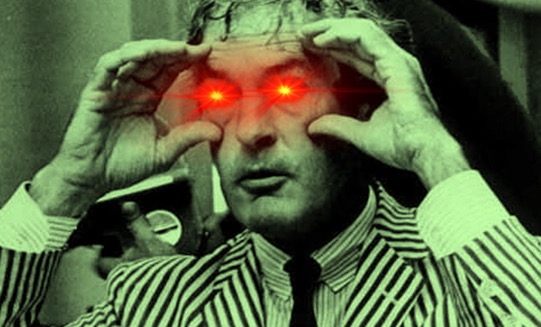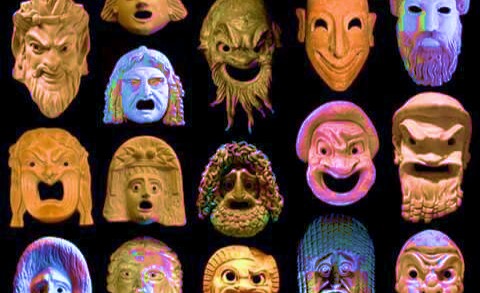Ideologues seem incapable of doing so without resorting to name-calling.
Digital Vitalism

Our decadent elite cannot survive our technological transformation.
Among the issues raised by BAP, what is the most potent and undeniable? Here is my answer. Rapidly, irreversibly, to the shock and incomprehension of our elites, the definitive modern framework for conceptualizing politics in the West is being denatured in the biochemical sense: its characteristic properties are being destroyed at the most fundamental level of its formation by certain powerfully disruptive effects.
The modern framework, inaugurated by Revolutionary-era France, is familiar to us as “the Right” versus “the Left.” We make a big mistake to understand this framework as just “factionalism” or “tribalism” or “the politics of division.” In reality what it describes is politics as an all-out world war, a universal war, for all the marbles of Man, waged by visions or visualizations big enough to encompass everyone and everything.
This is what is being dissolved and disintegrated today. BAP has made a deserved name for himself simply by concretizing the understanding of this fact into an artefact that resonates thunderously for a growing number of people on a visceral and personal level.
This is of interest to the Claremont Institute because of our central mission, which is to concentrate, preserve, and advance knowledge about the nature of regimes, their founding, and their re-founding—certainly with an eye toward the flourishing of our own American regime, but never, in fact, at the expense of understanding the nature of other regimes, especially in light of the lessons of political anthropology history painstakingly teaches.
Digital Destroys Modern Politics
But for all the importance of political philosophy to grappling with the theory and practice of regimes, what has consumed ever more of my own thinking since the election of President Trump has been sociological and technological. My understanding is that digital technology is the cause—the “formal” cause, to use Aristotle’s terminology—of the disruptive effects destroying at the “molecular” level the entire concept of politics that ruled the modern West and gave rise to its once all-powerful but now feverishly panicking elite.
By formal cause, Aristotle simply means formative, shaping cause, the kind of causation that an environment or what Marshall McLuhan calls a “surround” has on the perceptions, sensibilities, and attitudes of the people (and peoples) within it.
The way to understand digital technology is in these terms. It is a completelyimmersive environment that definitively and decisively shapes our experience of reality: of the world, of ourselves, of one another, of machines, and of the place in the world of us humans and of these entities David Bowie correctly described in 1999 as “an alien invasion.”
Digital operates in this way because it is a medium, a technology of communication. As McLuhan explains, all media are “extensions of man.” But for the first time, digital technology has made real the Bronze Age myth (?) of robotic demiurges…
The story of Talos, which Hesiod first mentioned around 700 BCE, offers one of the earliest conceptions of a robot….
The myth describes Talos as a giant bronze man that Hephaestus, the Greek god of invention and blacksmithing, built. Zeus, the king of Greek gods, commissioned Talos to protect the island of Crete from invaders. He marched around the island three times every day and hurled boulders at approaching enemy ships.
At his core, the giant had a tube running from his head to one of his feet that carried a mysterious life source of the gods the Greeks called ichor. Another ancient text, Argonautica, which dates to the third century BCE, describes how sorceress Medea defeated Talos by removing a bolt at his ankle and letting the ichor fluid flow out….
The myth of Pandora, first described in Hesiod’s Theogony, is another example of a mythical artificial being…. Hesiod’s original described Pandora as an artificial, evil woman Hephaestus built and Zeus ordered to Earth to punish humans for discovering fire….
In addition to creating Talos and Pandora, mythical Hephaestus made other self-moving objects, including a set of automated servants, who looked like women but were made of gold…. According to Homer’s recounting of the myth, Hephaestus gave these artificial women the gods’ knowledge.
In today’s digital world, reality has trumped myth. Myth lacks the status of reality. The source of myth, the human imagination, is rapidly losing status to the source of digital reality, the memory of machines. McLuhan described the essence of the environment fostered by computers as “perfect memory—total and exact.” He was right. In this environment ever more of us know ever more perfectly that the pre-digital world where human imagination ruled is dead, and the shaping force of machine memory is supreme.
And ever more of us grasp, even if we do not articulate it so explicitly, that this dethronement of human imagination is happening because the pre-digital media environment was televisual. Television formed us in the “image” of a technology that elevated the human imagination to god tier status of power and prestige. It took the modern conception of politics to the ultimate heights of violence and occult vitality. Whosoever could most expertly dream ultimate dreams, dreams with the power to move the masses to adopt and spread them, fight and die for them, would rule, and would be paid for the privilege.
Digital Dooms the Modern Elite
Until the advent of digital, this televisual elite was, in the West, blatantly and deeply and shamelessly liberal. But then things changed. We all increasingly grasp this because the elite has begun to act with deep bizarreness—a new degree of both viciousness and weakness. It is hard to know what, if anything, we can usefully call this new mutation of the old elite.
On Twitter, Spotted Toad, my contemplative associate in these matters, has written that “Wesley Yang’s ‘successor ideology’ is a good phrase for this stuff because it clarifies how it comes after other forms of ameliorative liberalism have failed, & how it seeks to dismiss & discredit these failures… but in doing so, dismisses & discredits the goals of liberalism itself.”
I say in furtherance of Toad’s interpretation that, before digital, our televisual elite saw liberalism as the only ideology remaining that could ensure a plentiful supply of their most precious resource: ethical fantasies. No more.
What is “after liberalism” on this vector is compulsory imagineering—a civilization where you are required to enact official dreams and receive a basic income sufficient to sustain them. Instead of endless economic “stimulus,” think endless stimulus of fantasy. The fantasy is the point.
That it has come to this signals that the digital disenchantment of what was referred to by the Disney company as “imagineering” across the board. The dethronement and denaturing of the academy, Hollywood, “the media,” the ad industry, and on and on is irreversible and definitive. But the successor imagineers know this would mean the end, so it’s “unthinkable.”
At the cusp of the electric age, Tocqueville, who saw “not better” than his contemporaries “but further,” glimpsed the “soft despotism” of a future regime that gently controlled the wills of all. In the electric age Orwell warned of a regime that ruled facts. We are now far beyond both.
Not always out of an “empowered” sense of choice, our weaponized imagineers have largely given up on commanding wills or bending facts to their will. Their vision of justice is now their mastery of make-believe, because they believe justice is the forced universalization—and coerced “limitlessness”—of the imagination. This weaponized, officialized Disneyism seeks to rescue rule of the imagineers from digital disintegration by mobilizing the world around their last-ditch, ultimate fantasy: an all-out war of the imagination fought to “save” the imagination, the rule of which, meaning their rule, is presented as indispensable to saving the world.
But under digital conditions, this vision of compulsory “emancipation” grows more intense even as it grows weaker—lesscompelling, less authoritative, less sexy—as a whole. Just look at how the successor ideology squeezes sexuality and gender so maniacally for “limitless fantasy.” While allegedly very body-oriented, the forcible transformation of mere perversity or sybaritic enjoyment into ideologies—queerism, polyism, panism, transism, and ultimately posthumanism—betokens a decadent and delusional journey to the outer limits of the cult of the “spirit,” actually assaulting the bodily integrity and natural anthropology that BAP, but far from just BAP, are instinctively rushing to defend in the name of a new “vitalism.”
Digital moves to center perceptual stage the defining difference between humans and machines. People are grasping that “limitless fantasy,” especially coerced and subsidized, won’t save us from servitude at the hands of machines, whose memory rules more than any imagineers can.
So the successor ideologues of the televisual elite, pounding the bunker table and snarling out orders to armies of fantasies instead of fantasy armies, is in a terminal state. Its last all-out meme war of the world may be (characteristically) ugly and brutal, but it will fail.
The American Mind presents a range of perspectives. Views are writers’ own and do not necessarily represent those of The Claremont Institute.
The American Mind is a publication of the Claremont Institute, a non-profit 501(c)(3) organization, dedicated to restoring the principles of the American Founding to their rightful, preeminent authority in our national life. Interested in supporting our work? Gifts to the Claremont Institute are tax-deductible.
Nothing really matters, zany pervs can see.
The BAPists may be fun to read, but there is little of value beneath their empty aesthetic.
Traditional conservatives could use a fresh rhetoric of masculinity.
New artefacts overthrow old impostures.
What should the Right make of Bronze Age Pervert and his Twitter devotées?






